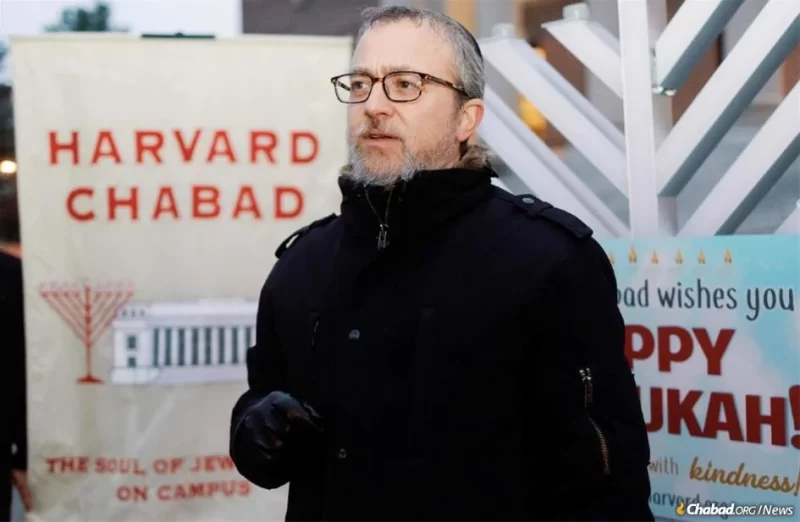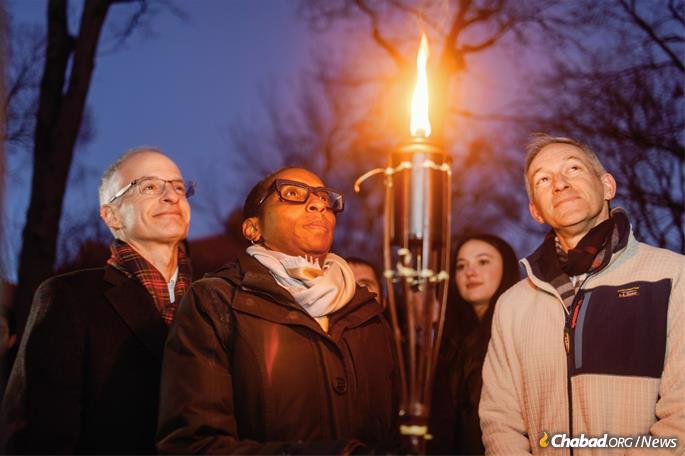
Unhiding the Menorah at Harvard Yard
by Dovid Margolin – chabad.org
Every night of Chanukah for the past 24 years, a large menorah has been kindled on Harvard Yard, Harvard University’s iconic green. And every night of Chanukah for the past 24 years, once the music and celebration is over and the lights have burnt out, that menorah is packed up and hidden away.
This telling detail was shared by Rabbi Hirschy Zarchi, director of Harvard Chabad and the Jackie and Omri Dahan Harvard Jewish Chaplain, on Wednesday evening, Dec. 13, when Harvard’s Jewish community gathered again among the criss-crossing paths of Harvard Yard to light their menorah. Though it is kindled every night, on this evening, the eyes of millions were upon them.
It was the seventh night of Chanukah, and the Jews of Harvard were joined by university President Claudine Gay. At Harvard’s menorah-lighting just a night earlier, Professor Steven Pinker, who is Jewish, had been viciously attacked as he shared personal stories of his family’s survival of the Kishinev pogroms and the Holocaust.
Addressing Gay, Zarchi recalled her previously iterated promise to have the Jewish community’s back. “We didn’t feel it last night,” the rabbi said. “There was no one watching over us. And there’s yet been no voice condemning what happened.”
Gay, of course, was one of three university presidents whose testimony before Congress a week earlier regarding the acceptability of calls for genocide against Jews on campus left much to be desired—to put it mildly. Whether threats against Jews were deemed harassment “depends on the context,” Gay insisted, her answer guiding a national spotlight on the reality Jews face in the world of the academy and in the nearly 400-year-old school, in particular.
“Friends, we are gathered at a moment when the eyes of the world are upon us,” Zarchi acknowledged to the crowd, including the president. “Everybody’s looking at Harvard now, and it pains me to say, sadly, that Jew-hate and antisemitism is thriving on campus.”
It is no secret that Jews have been made to feel unwelcome on university campuses throughout the United States. With enlightened Harvard emerging as a paragon of this benighted development, the imagery of the Ivy League school’s Jewish community being forced to hide their menorah was a particularly powerful one.
“The university, since that first Chanukah, would not allow us to keep this menorah here overnight because there is fear that it’ll be vandalized,” said Zarchi, who together with his wife, Elkie, established Chabad-Lubavitch of Cambridge, Mass., in 1997. “Think about that. We’re trying to fix the world, the future leaders of the world, [and] on our campus, in the shadow of Widener Library, we in the Jewish community are instructed … ‘Don’t leave [the menorah] out overnight, because there will be criminal activity … and it won’t look good.’”
Silence by Faculty and Fellow Chaplains
Zarchi spoke of Jewish faculty and students being harassed, afraid to appear as identifiably Jewish on campus. He spoke of how, after hosting a screening of IDF footage of the Hamas terror organization’s war crimes in Israel, Harvard police called to advise him to hire security to protect his family and students. He recounted the silence not only of Harvard’s faculty but his fellow university chaplains, none of whom could muster the strength to condemn a genocidal attack on the Jewish people.
But the evening was not about anger, it was about hope—and a prayer for action. Action is central to the story and message of Chanukah.
Chanukah recalls the victory, 2,100 years ago, of a militarily weak but spiritually strong Jewish people who liberated the Land of Israel from a ruthless enemy. Their military victory culminated with the rededication of the Temple in Jerusalem and the kindling of its menorah, which had been desecrated by the enemy. The Jewish people have celebrated these miraculous events ever since by lighting a menorah, whose light and warmth fills their homes, spreading outward to the streets outside.
Illuminating the world cannot be done with words alone, for it is “necessary to take tangible action,” the Rebbe, Rabbi Menachem M. Schneerson, of righteous memory, once wrote of Chanukah. This is “exemplified by kindling a physical light, using a wick and oil or the like—indeed, this is how the Mitzvah is actually carried out.”

This is a fundamental requirement of Chanukah: That the light of the menorah be physically visible to everyone in the home.
“We’re hopeful, we’re very hopeful,” Zarchi said. “But we know hope alone is not enough.”
Change comes when scholars stop using their knowledge and intellect to justify twisted, horrific actions. When they gain the courage to not just walk by and remain silent amid calls for the death of Jews, but speak out with vigor. “That’s the story of Chanukah,” Chabad.org’s Tzvi Freeman recently wrote. “It is a redemption of Athens as much as it is of Jerusalem. It is about restoring the inner light so that the outer light can function in full health once again.”
Zarchi’s message to President Gay, Harvard, and all who look up to the institution and what it represents, was simple yet profound: We’ll know something’s changed when Harvard’s menorah can remain standing for the duration of Chanukah. When its light permeates the hearts and minds of the men and women who fill its halls of knowledge, and through them, the world.













meyer chein
Support Yeshiva University and Touro college and to hell with the anti-semites